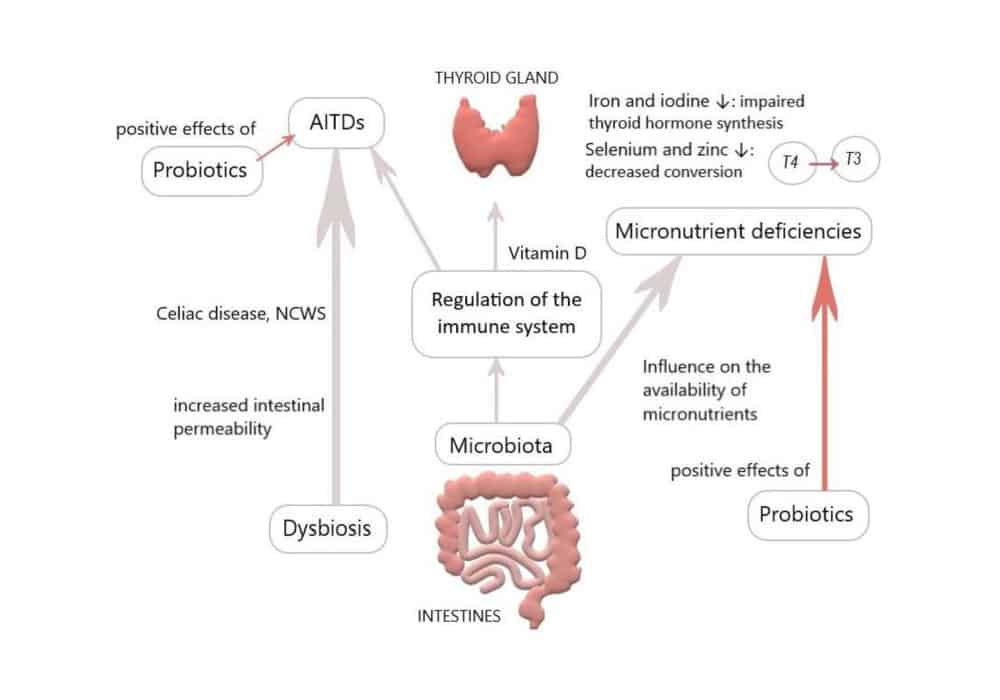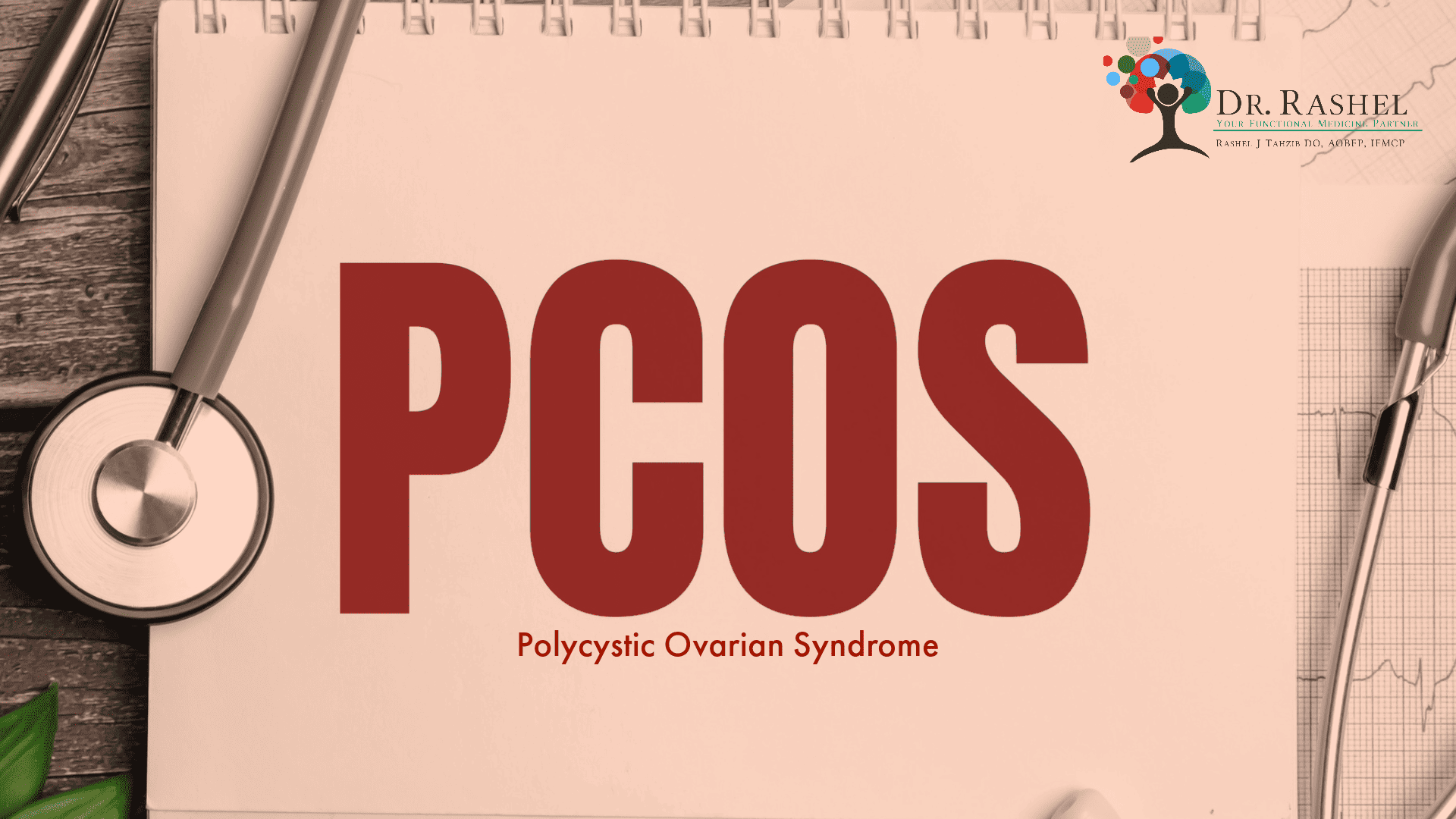Table of Contents
Introduction To The Gut Thyroid Connection
Most of you have heard about hypothyroidism, low functioning thyroid, especially if you are connected to the contemporary medicine world, there has been a huge drive over the past few decades on increasing awareness around thyroid problems. Because conventionally thyroid problems are underdiagnosed and under-treated, getting a thyroid diagnosis can even be relieving in some sense. Many who experience symptoms like fatigue, depression, brain fog, difficulty concentrating, constipation, or hair loss are led to believe that these problems are “just in your head” and prescribed an antidepressant especially if limited tests ordered seem in range, conventionally. Once you’re finally diagnosed with hypothyroidism and treated with thyroid medication, some of your symptoms may improve and you feel relieved that you finally know what’s wrong and have a diagnosis. However, it’s very likely that the thyroid diagnosis is the tip of the iceberg. There is a strong connection between thyroid health and gut health, and symptoms of thyroid disease and gut imbalance overlap, meaning they are the same symptoms. Why is this important? Because the root of your problem is more likely gut dysfunction. If untreated imbalances in the gut will lead not only to ongoing symptoms but act as a gateway to chronic disease and autoimmunity.
If you have been diagnosed with hypothyroidism or Hashimoto’s Autoimmune Thyroid Disease you have likely experienced symptoms such as fatigue, bloating, brain fog, depression, anxiety, or constipation.
What I will share with you in this article is that the root cause of these symptoms is likely gut dysfunction, not hypothyroidism.
Even if you do not have symptoms that strictly belong to the digestive tract, such as changes in bowel movement, gas, or bloating, having a thyroid problem alone is reason to investigate your gut health, and is supported by a solid body of scientific data.
Over the past few decades there has been an increase in understanding of the connection between the gut and the rest of the body. We now have a great body of information on the human microbiome and the connections between gut microbes and other areas of the body such as the Gut-Brain Connection. The gut is described as a second brain in the way that it interacts with and impacts all other areas of the body. Just as we know that gut health and gut microbes orchestrate your metabolism, cardiovascular, brain, and immune health they also orchestrate your thyroid health.
Functional Medicine has understood these connections for decades and in recent years conventional medicine is slowly moving toward this understanding.
I hope that by reading this you get more control over your health with a deeper understanding of what contributes to thyroid problems by increasing your awareness on the relationship between your gut and your thyroid, and how to heal it.
If you experience gut thyroid symptoms, its definitely not in your head but it can be in your gut! Symptoms identified as relating to the thyroid can be caused by caused by gut problems due to the gut-thyroid connection. Although the gut thyroid connection is supported by a significant amount of research, it is not addressed in the average medical practice. The gut thyroid connection can be the key to why you are not feeling your best, whether you have a thyroid diagnosis or just experience symptoms. I will share information from the scientific evidence supporting the gut thyroid connection and helpful tips on how restore balance to your gut thyroid connection and get you back on the path to optimal gut and thyroid health.
What Is The Gut Thyroid Connection
The strong connection between thyroid health and gut health is supported by numerous medical studies. We know that most patients who have thyroid issues, when tested also have gut imbalance. Also common symptoms associated with hypothyroidism like fatigue, bloating, brain fog, depression and anxiety are also common symptoms in those who have gut issues. Most importantly, when we treat gut imbalances such as SIBO, Leaky Gut, and gut microbial imbalance thyroid health and its associated unpleasant symptoms including fatigue, brain fog, bloating, constipation, depression and anxiety improve and thyroid antibodies and gut thyroid inflammation decrease. The gut thyroid connection is most highlighted by increased intestinal permeability also known as leaky gut. Leaky gut is the most common cause of inflammation. It begins in the gut, outside the thyroid, but leads to autoimmune conditions affecting distant organs like Hashimoto’s Thyroiditis and other autoimmune disease.
Although thyroid medication is helpful for decreasing some symptoms commonly associated with hypothyroidism, it will usually not resolve all symptoms or address the root cause. Addressing gut health is worthy because the gut is often where the root of the problem lies. Ultimately the gut be treated to restore balance to the thyroid and promote whole body health.
Below are ways that your gut health connects to and dictates your thyroid health. Let’s dive in!
Examples Of Research On The Gut Thyroid Connection
- —> Autoimmune thyroid disease is more common in patients with celiac disease and patients with non-celiac gluten sensitivity
- —> Children who have Hashimoto’s Disease more frequently have leaky gut compared with other children
- —> About half of the patients with Autoimmune Thyroiditis – Also have low stomach acid
- —> Low stomach acid results in patients needing more thyroid medication
- —> Greater than 50% of people with IBS also have fatigue
- —> Chronic fatigue syndrome symptoms improve when leaky gut is treated
- —> Most people who have sensitivity to gluten also have fatigue and malaise
- —> Small Intestinal Bacterial Overgrowth is correlated with Brain Fog
- —> Irritable bowel syndrome patients frequently have depression and anxiety
- —> Treating gut problems improves fatigue, depression, anxiety, brain fog, all symptoms correlated with thyroid dysfunction
- —> Eliminating Gluten and Lactose improves gut thyroid levels and lowers antibodies
- —> Treating the parasite Blastocystis Hominis in positive individuals improves thyroid function and reduces inflammation
Now let’s dig deeper into the ways your gut health is connected to your thyroid health.
Thyroid Health Depends On Microbiome Health
We know that our microbiome functions as a second genome, essentially dictating wether there is health or disease. Your gut microbiome is made up of the trillions of different microorganisms that include mainly bacteria, as well as some fungi, and viruses that live in your intestinal tract. The microbiome, is made up of bacteria and other microorganisms that live inside the body’s organ systems and on skin surfaces, is essential for immune function, metabolism, inflammatory balance, cell regulation and more. Your intestinal microbiome regulates inflammation in your body and is an integral part of your immune system comprising over 70% of the immune system. Imbalanced gut bacteria are not only associated with virtually every disease including obesity, high blood pressure, high cholesterol, diabetes (type I and 2), autoimmune disease such as rheumatoid arthritis, psoriasis, cancer, fibromyalgia, multiple sclerosis but also thyroid dysfunction. Healthy gut microbiota are necessary for healthy thyroid function. It’s for this reason that thyroid disease and gastrointestinal disease often coexist in the same patients. Studies show that Hashimoto’s Thyroiditis and Grave’s Disease (the most common causes of thyroid disease) occur with celiac disease and non celiac wheat sensitivity in the same patients. This likely happens due to inflammation and immune activation caused by leaky gut when larger proteins leak from the intestines into the blood stream as a results of increased intestinal permeability. We also see imbalanced gut bacteria (Dysbiosis) in patients who have thyroid problems including Hashimoto’s autoimmune thyroiditis, as well as in patients with thyroid cancer who have higher numbers of carcinogenic and inflammatory bacterial strains in their gut.
The composition of your gut bacteria influences the availability of essential micronutrients for your thyroid gland. Iodine, iron, and copper are crucial for thyroid hormone synthesis, and selenium and zinc are needed for converting T4 to the active form of thyroid T3, and vitamin D helps regulate the immune response. These micronutrients are often deficient in Hashimoto’s autoimmune thyroid disease causing poor gut thyroid function.
There are people who don’t have classic digestive complaints but still have gut imbalance. These are some of my more tricky patients because they may feel they don’t need to assess their gut health, even though they have a gut thyroid problem. If you have low gut thyroid function, Hashimoto’s Disease, or any autoimmune condition, gut heath must be part of the plan if you want to improve your health.

One of my favorite supplements for overall health is a high quality probiotic that supports your gut health and microbiome and has beneficial effects on thyroid function. Therbiotics Supreme Daily DF is a multi-strain, acid stable, high CFU pharmaceutical grade probiotic formula that supports intestinal microbial balance. Research supports the fact that patients with gut thyroid problems should have their gut health supported and their gut bacteria assessed for better health and outcome.
Licensee MDPI, Basel, Switzerland. This article is an open access article distributed under the terms and conditions of the Creative Commons Attribution (CC BY) license (http://creativecommons.org/licenses/by/4.0/). Nutrients. 2020 Jun; 12(6): 1769. Published online 2020 Jun 12. doi: 10.3390/nu12061769
Thyroid Function Depends On Healthy Digestion And Nutrient Absorption
Thyroid function is dependent on multiple micronutrients that are absorbed from food through a healthy digestive system. The health of your gut, digestion and microbiome impact how you absorb micronutrients. Some of the micronutrients necessary for optimal thyroid function are iodine, selenium, zinc, copper, iron, B vitamins and amino acids like tyrosine, all needed for a normal, healthy functioning thyroid. It’s not surprising that most people who have thyroid problems are deficient in these nutrients. The gut microbiome and digestive capacities also influence the function of many of the body’s enzymes including deiodinase enzymes that convert inactive thyroid hormone T4 to the active T3 form. The deiodinase enzymes are selenium-containing enzymes used to make T3, the active form of thyroid hormone. Deiodinase enzymes have been found in the intestinal wall, and it is likely that gut bacteria not only play a role in deiodinase enzyme activity but even have the ability to bind thyroid hormones. Without optimal digestion and healthy gut bacteria, normal thyroid function and thyroid hormone production are impaired. I see this commonly in my practice, most patients with hypothyroidism or Hashimoto’s also have low nutrients on testing and coexisting digestive problems.
The Thyroid And Gut Are Connected By Way Of Stomach Acid Production
Stomach acid is essential to health. Low stomach acid known as hypochlorhydria, is not only the root cause of aggravating symptoms like acid reflux, abdominal bloating and burping and problems like acne, nutrient deficiency including vitamin B12 and iron deficiency, it also contributes to autoimmune conditions like Hashimoto’s thyroiditis. When stomach acid is low, digestion is incomplete and food particles like proteins are only partially digested. This inadequate digestion results in poorly digested proteins circulating in the bloodstream that can trigger an immune response, cause leaky gut, and food sensitivities such as to gluten and dairy, leading to autoimmune inflammatory conditions like Hashimoto’s thyroiditis. Stomach acid deficiency also contributes to Small Intestinal Bacterial Overgrowth (SIBO) because aside from nutrient absorption, one of the main roles of stomach acid is killing pathogens that enter the gastrointestinal tract and keeping bacterial overgrowth in check which would otherwise grow, feeding on the undigested proteins. It’s not surprising that more than half of patients with hypothyroidism have SIBO as studies show.
Those with low stomach acid also frequently experience fatigue and constipation, symptoms that are commonly associated with hypothyroidism. One of the key points is that hypothyroid symptoms and gut dysfunction symptoms, including SIBO overlap illustrating that the two problems are intricately connected. When the symptoms arise, or thyroid numbers are off, the issue is actually gut dysfunction causing the gut thyroid problems. The problem is exacerbated because hypothyroidism further causes sluggish digestion, constipation, and low stomach acid fueling small intestinal bacterial overgrowth (SIBO). Therefore there is a continuous vicious cycle. Looking at this physiology it’s not surprising that studies also show a link between autoimmune atrophic gastritis and autoimmune thyroid disease.
Once of the most helpful tools you can use to support your gut digestion and as a result your thyroid health is using high quality digestive enzymes. My go to is Digestizyme Supreme because its a comprehensive, high potency digestive enzyme formula that supports fat, protein, carbohydrate, fiber and gluten digestion along with Digestizyme Betaine HCL to support stomach acid production, vitamin and mineral absorption and microbial balance. High quality, comprehensive, potent digestive enzymes are key in supporting your digestive and thyroid health, promote nutrient absorption, and help you stay on track when it comes to avoiding and healing problems like SIBO or H pylori.
Gallbladder Bile Flow Affects Thyroid Enzyme Activity
The gut is further involved in thyroid function through the connection of bile acids made by the gall bladder. Bile acids are made by your gallbladder after you eat fats. Bile acids not only help you digest fats into fatty acids that are then used for energy, but also have antimicrobial properties. Bile acids are then metabolized by your gut bacteria which then increase activity of the deiodinase enzymes. These processes are also dependent on micronutrients like selenium that if low further negatively impacts this process. The strong connection between the gut and thyroid is demonstrated here again because a low functioning thyroid actually slows down gall bladder bile flow which impairs digestion, but as described above further impairs thyroid health by decreasing T4 to T3 conversion. This is a vicious cycle because just this impairment in bile flow caused by a low functioning thyroid can contribute to gut infections like candida overgrowth or SIBO, and other imbalanced gut bacteria, since bile has antimicrobial properties. Let’s continue to explore the thyroid gut connection because it doesn’t stop there.
Healthy Thyroid Function Depends On Healthy Liver Function
Your liver also plays an important role in thyroid function. Healthy liver function is not only needed for detoxification of environmental toxins like alcohol, pharmaceutical drugs, heavy metals, pesticides, but is needed for proper digestion of fats, proteins, sugars, and blood sugar regulation. However, your liver cannot function optimally without a healthy thyroid. There is a complex relationship between liver and thyroid health. The liver plays an essential role in thyroid hormone activation and metabolism and in turn thyroid hormone levels affect liver cells and liver metabolism. Thyroid health also impacts healthy pancreatic enzyme production which further impacts digestion and blood sugar regulation.
Considering the dependent relationship between thyroid health and gut health and healthy organ metabolism, appropriate testing is needed to correctly identify both thyroid problems and imbalances in gut function. If you are concerned about your gut thyroid relationship or have some of the symptoms discussed above, below are tests you need to identify disruptions in healthy gut thyroid axis.
What Causes Impaired Gut Thyroid Connection
Use of antibiotics, oral contraceptives, NSAIDS (Motrin, Ibuprofen, Aleve), poor diet, chronic stress, toxins can negatively affect gut flora, impair gut health, fuel leaky gut and thereby result in thyroid disease and hypothyroidism. Other medications that can impair gut health and the gut thyroid connection include antacids and proton pump inhibitors like Tums, Protonix, Prevacid because they hinder digestion, decrease absorption of vitamins and minerals and can fuel bacterial overgrowth and as we will discuss below al of this impairs thyroid hormone production and healthy thyroid function.
Tests That Diagnose Gut Thyroid Dysfunction:
- Complete Thyroid Tests: TSH, Free T4, Free T3, Reverse T3, Thyroglobulin and Thyroid Peroxidase antibodies. Learn more about why it’s important to do a complete thyroid panel and how conventional medicine can under diagnose and under thyroid conditions Here.
- Nutrient levels: Ferritin, Iodine Spot Urine, Zinc, Selenium
Getting standard blood and urine tests for these nutrient levels will identify deficiencies or inadequacies in these important nutrients all needed for optimal thyroid function and conversion
- Complete Stool Analysis with Parasitology Doctors Data (CSAP)- I have found this test to be the most accurate and clinically useful over the past 2 decades of testing. The problem with other tests is that they are not as accurate and most of the time patients who get other tests done still have the issues ongoing when I see them, the problems were not accurately described and treated. You can learn accurate information about your gut health by taking your Comprehensive Stool Analysis Parasitology (CSAP) . This test includes a culture which is the gold standard of testing for bacterial, fungal or parasitic growth vs other tests that test for metabolites not the actual growth of the organism. CSAP also identifies amounts of beneficial bacteria, growth of imbalanced or dysbiotic bacteria, growth of yeast and any parasites and viruses. The test also includes markers of inflammatory bowel disease and irritable bowel syndrome, assessment of the digestion of fat, protein or carbohydrates, and levels of secretory IgA and short chain fatty acids.
- 3-Hour Breath Test For Small Intestinal Bacterial Overgrowth- identifies bacterial overgrowth in the small intestine a common problem that is often missed (vs CSAP that assesses the large intestine). This is a 3-Hour Methane And Hydrogen Breath Test For SIBO you do in the comfort of your home that measures methane and hydrogen production by bacteria in your small intestine to identify SIBO.
The Gut Thyroid Connection And Leaky Gut
We also see the connection of the thyroid and the gut through leaky gut. Leaky gut or increased intestinal permeability is the condition where the tight junctions of the lining of the gut or intestinal mucosal barrier become injured by microbes, toxins, infections, allergens, and stress resulting in larger gaps between the tight junctions making them ‘leaky’. When the intestinal lining is healthy it functions as a gate keeper, letting micronutrients from food pass through to your bloodstream while keeping out toxins, allergens and pathogens out to avoid immune inflammatory reactions. When the intestinal lining is injured and the tight junctions become damaged causing increased intestinal permeability, not only micronutrients pass through into the blood stream but also larger molecules that under healthy conditions would not get through. As these toxins, allergens, undigested food particles and pathogens continue to leak into the bloodstream, this triggers inflammation and immune activation. As the immune system sees these foreign particles, that under healthy conditions do not belong in the blood stream, it creates antibodies to attack them just as you make antibodies to attack foreign viruses and bacteria in an infection. These autoantibodies are created as the toxins travel through your body’s different organs, and results in the body attacking it’s own tissues as seen when the body creates antibodies against thyroid tissue in Hashimoto’s Autoimmune Thyroiditis which then sabotages your thyroid health and ability to produce thyroid hormones.
Symptoms of Impaired Gut Thyroid Connection
Here’s where it gets tricky because most symptoms are fair game when the gut thyroid connection is impaired and symptoms of thyroid imbalance and gut imbalance overlap. But what’s important to understand is that many of the symptoms experienced in those with gut imbalance, overlap with and are the same symptoms associated with thyroid problems. Most patients with gut problems like SIBO, low stomach acid, celiac or non celiac gluten sensitivity, IBS, also have thyroid problems and share common symptoms.
A healthy digestive tract is imperative to good health. Digestive problems result in more than localized digestive symptoms like bloating, gas or constipation. Digestive issues can result in chronic health problems that affect distant organs by way of leaky gut and impaired thyroid function is among them. The following are some symptoms and conditions that are seen when the gut thyroid connection is impaired. Any one of these symptoms is enough to consider assessing the gut thyroid connection.
Symptoms/Signs Of Impaired Gut Thyroid Connection
- Digestive Problems: Bloating, Gas, Constipation, Burping
- Irritable Bowel Syndrome
- SIBO, Candida, H-Pylori
- Leaky Gut
- Multiple Food Sensitivities/Or Non Celiac Gluten sensitivity
- Fatigue
- Joint Pains
- Brain Fog/Difficulty Concentrating
- Depression/Anxiety
- Skin Issues: Dry Skin, Rosacea, Eczema
- Autoimmune Disease: Hashimoto’s thyroiditis, lupus, rheumatoid arthritis, psoriasis, celiac
- Chronic Fatigue/Fibromyalgia
- Hormonal Imbalance: Irregular Periods, PMS, Painful Periods, or PCOS
The Missing Piece For Thyroid Problems
This overlap between gut and thyroid symptoms leads to a common problem for thyroid patients. Once you get a diagnosis of thyroid disease like hypothyroidism, most physicians focus exclusively on thyroid treatments without considering other options or causes. The result can be using different thyroid treatments, without ever actually resolving all symptoms. I address thyroid dysfunction in my practice and do treat low thyroid function frequently, usually with natural desiccated thyroid, because thyroid medication is very helpful for improving your thyroid hormone levels, and most symptoms, however it doesn’t always lead to complete symptom resolution. That’s why I strongly encourage investigating and addressing gut issues that are the missing piece for thyroid patients which is highly supported by research but often missed.
Gut Treatments Improve Thyroid Health
When we treat gut problems, thyroid function and hypothyroid symptoms like fatigue and depression improve as shown by numerous studies.
Some examples of this connection include: removing dietary gluten and dairy in Autoimmune Thyroiditis and seeing improvement in thyroid function and lowered anti-thyroid antibodies. Thyroid function improves because these foods contribute to food sensitivities due to underlying Leaky Gut and or SIBO. We also know that when gut infections with Helicobacter Pylori (a bacteria) and Blastocystis Hominis (a parasite) are treated, thyroid function including TSH levels, and anti-thyroid antibodies in Hashimoto’s Autoimmune Thyroiditis improve.
Overall, research and clinical evidence, clearly show that if you have symptoms that fall under thyroid symptom umbrella or if you have a diagnosis of hypothyroidism or Hashimoto’s, supporting your gut health is a crucially important step to decreasing negative symptoms, improving gut health, thyroid health and overall health and well-being.
How To Heal Your Gut Thyroid Connection
The best way to heal your gut thyroid connection is using the 4R Program. Although fully healing your gut can take time, realistically half the time it took to get your health to its current condition, improvements are seen relatively soon after starting the regimen. Healing can be done in one to two years. During this time large increments of improvement happen that span overall health and thyroid health. It is not unexpected to see marked improvement in symptoms, improved digestion, improved energy levels, decrease in brain fog and better mood achieved in one to four weeks when a 4 R program is properly implemented and you are well on your way to full healing. As healing occurs it is not uncommon to need less thyroid medication and have improved overall health while preventing further imbalance or disease from coming up in the body.
The 4R Program
I have used the 4R program founded on Functional Medicine Principles successfully for years. The program presents four steps remove, replace, reinoculate, and repair that address the necessary components needed to restore balance to the gut and thereby heal medical conditions. The process takes about six months and can take longer depending on how severe the problems are and what conditions are involved and how well the program is followed.
Remove
The first step in the 4R Program is removing anything that be an assault to the body. The Remove step includes removing any aggravating foods or toxins that include foods high in lectins such as beans, soy, gluten, corn, conventional dairy, processed foods and food additives, medications like NSAIDS, acid blockers, synthetic hormones like oral or injectable contraceptive drugs since all of these can be inflammatory, can cause leaky gut and contribute to the vicious cycle of leaky gut and thyroid dysfunction and autoimmunity. I always suggest removing gluten, dairy, soy, beans, corn and most grains except rice and quinoa although this very last part and removing beans is not suggested by most others in the field, I have found it is tremendously helpful in healing the gut and improving overall health and autoimmunity in most people due to these foods being extremely high in lectins which are difficult to digest proteins. I do not include eggs for everyone on the Remove list, some other clinicians in the field do remove eggs but do not remove beans and oats for example. Clinically I have found that that removing beans and most grains rather than eggs is more valuable overall, for most patients, and it enables them to still benefit from the numerous nutrients and B12 in eggs and the fact that eggs don’t raise insulin and do improve lipid profiles.
The Remove step also includes removing processed foods and chemicals or food additives from your diet. Most are not aware of the tremendous amounts of chemicals in American foods, most banned in European countries. These food additives wreak havoc on every aspect of your body. I always say if you do not recognize the ingredient clearly as food, or a food your great grandmother would clearly recognize as food, then it should not be eaten, at least not as far as supporting health or disease prevention is concerned. There are a myriad of chemicals passed off as food snuck into your diet by the food industry. There are more than 10,000 food additives used in the US, many banned by the European Union, Japan, China, Australia and other countries for being hormone disruptors, linked to serious disease or carcinogenic. You can learn more about common food additives to avoid in Guide To Food Additives. Some clinicians suggest removing coffee, in my clinical practice coffee is not the problem and in fact has many benefits, the bigger problem are the chemicals in food and higher lectin foods. Removing alcohol is a good idea, but again one glass of organic wine may not be as much a problem as consuming high lectin foods like beans and foods containing additives, passed off regularly even in so called plant based foods disguised as healthy. When it comes to Sugar eliminating sugar except small amount of natural sugar like honey, maple may be ok. This does depend on your unique situation if you are dealing with Insulin issues or candida. We also want to make this realistic for people and that’s why I differentiate natural sugar here.
Remove also includes removing non-essential drugs like Advil, Motrin, antacids, and synthetic oral contraceptives (using other contraception not disturbing to female health). These medications can disturb gut health and lead to leaky gut. Lastly, Remove includes doing the best you can to remove or decrease your exposure to environmental toxins such as lead, mercury, arsenic, aluminum, pesticides, phthalates in plastics, estrogen like substances and other toxins used in farmed fish. These toxins cause dysbiosis or imbalanced gut bacteria and contribute to leaky gut as well as other disease. Avoiding medications unless absolutely necessary, avoiding farmed fish and larger wild fish, drinking quality filtered water, avoiding toxic cookware, using only 100% organic natural skin products, decreasing plastic use and eating organic all help to decrease your exposure to toxins.
Replace
The second step in the 4R program is replacing the bad with the good. Replacing imbalanced gut microbes, dietary allergens, food additives, and environmental toxins with micronutrients, healing foods digestive enzymes, gut healing nutrients and amino acids, and beneficial bacteria. We want to replace anything bad that does not belong in the body, with the good that will support, heal and nourish the body. This step includes adding in healing foods that feed your healthy gut bacteria and promote a healthy gut microbiome digestive enzymes and targeted nutrients that heal and nourish the gut. You can read more by reading How to create a healthy gut microbiome. Replace involves adding in synergistic supportive nutrients like those in Leaky Gut Restore to heal leaky gut and seal the larger gaps between the intestinal cell tight junctions that have resulted from increased intestinal permeability. Replace also includes adding back in digestive enzymes like Digestizyme Supreme and Digestizyme Betaine HCL, to support optimal digestion. As discussed above digestive enzymes are key to healing the gut thyroid connection, optimizing digestion, vitamin and mineral absorption, decreasing undigested food particles that cause bacterial overgrowth in SIBO, inflammation and worsen leaky gut and autoimmunity.
Reinoculate
The third step in the 4R Program is re-inoculating your gut’s beneficial flora. This involves replacing diminished good bacteria and supporting an environment where the good bacteria can grow, on their own, in your gut and thrive. What most people may not realize is that this does not happen immediately or just because you are taking a probiotic from the general market place. Patient’s who are prescribed antibiotics often tell me they are led to believe that there will be no gut issues because they were told they ‘can just take a probiotic’. It does not work that way. Just taking a probiotic along with antibiotics does not shelter us from their damage to gut beneficial flora and does not result in re-inoculation of the destroyed good bacteria. Re-inoculating your guts beneficial bacteria involves taking quality probiotics but also adding in fermented foods, and foods rich in polyphenols and prebiotics to help create an optimal environment for their growth in your gut, independent of taking the probiotics.
Probiotics
Using high quality, pharmaceutical grade, high colony forming, acid stable probiotics like Therbiotics Supreme Daily DF is key to helping to re-inoculate your guts healthy bacteria. When you take quality research based probiotics they pass through the gut and exert their numerous benefits. They don’t always colonize the gut. Thats where the other steps come in. Creating the environment that will help them colonize and grow and not kill them. Having a diet rich in probiotics and polyphenols helps beneficial bacteria to colonize and grow.
Fermented Foods
I love using organic, raw, cultured vegetables to help re-inoculate the gut with good bacteria. Using pickles, sauerkraut, and other fermented vegetables like beets and carrots can promote the growth of good bacteria in the gut.
Polyphenols
A diet rich in polyphenols, that are certain plant compounds with numerous health benefits, also promotes the re-inoculation of your beneficial gut bacteria. Polyphenols can not easily be digested and absorbed in the body so they are digested by gut bacteria in your colon and promote the growth of the good gut bacteria. Some foods rich in polyphenols include green tea, blueberries, broccoli, almonds, red wine, grape skin, dark chocolate, and onions. Including these foods in your diet is great way to support growth of beneficial gut bacteria.
Prebiotics
Prebiotics are fibers that are not digestible by your digestive tract but digestible by your gut bacteria. Prebiotics feed your beneficial gut flora with nutrients that help them grow and support your digestive, immune, metabolic and systemic health.
One of the things your good gut bacteria do with prebiotic fiber is turn it into short-chain fatty acids like butyrate which help keep colon cells healthy and support healthy metabolism and weight.
Studies suggest that butyrate production in the colon cannot be maintained without adequate intake of prebiotic fiber. Some prebiotic foods are Jerusalem artichoke, leeks, dandelion greens, asparagus, blueberries, garlic, onion, and banana.
Repair
The final step in the 4R program is to repair the intestinal lining that is damaged by toxins, imbalanced gut bacteria and food allergens resulting in increased intestinal permeability or a leaky gut that is the gateway to autoimmune disease including thyroid disease. My favorite way to do this is using the comprehensive repair formula, Leaky Gut Restore which includes gut healing ingredients like nourishing L glutamine and healing aloe, licorice and arabinogalactan nourishing your gut with the healing nutrients it needs to repair a healthy mucosal lining and healthy colon cells along with Collagen Peptide Powder (Grass-Fed) that works like an amino acid rich glue that can help seal the leaky tight junctions repairing your intestinal lining. Other helpful repair supplements are curcumin, I use Curcumin Pure Extract, a highly bioavailable potent turmeric formula, that helps decrease inflammation in the intestinal lining and throughout the body. I also love Gut Repair, which can be a potent secret gastrointestinal healing because of its effectiveness in healing gastric mucosa and not commonly used in average protocols. It includes Zinc Carnosine, studied and shown to heal gastritis and support the health of the mucosa, an integral part to repair. This helps heal and prevent problems like SIBO, B12 deficiency, other mineral deficiencies, pernicious anemia and more.
Healing the gut is an important root cause solution that helps every other aspect of health including both prevention of thyroid problems and improvement of thyroid imbalances and autoimmunity.
How Can You Tell That Your Gut Thyroid Connection Is Improved?
Healing the gut can be challenging, it takes dedication and commitment but equally gives rewarding results as most things in life. So how do you know all your efforts have paid off? Although you can test and retest for problems like leaky gut this test is not always necessary because most of the time your symptoms tell you all you need to know especially when it comes to assessing improvement in gut health. Some of the best ways to know you have healed your gut and gut thyroid connection include improvement or all together elimination of any digestive symptoms like bloating, burping, gas, reflux, constipation, gas, loose stool or abdominal pain. Other signs include improvement in skin issues including acne, rosacea, eczema and dandruff and improvement or elimination of aches and pains in hand or joints that may have come and gone. Improvements in energy, sleep, brain fog and mood are also fair game and can be expected. If you had developed significant food sensitivities and your diet had become limited you may notice that you can tolerate many more foods but this area is one you should be careful with because this can be a gateway to eating poorly or more and more of foods that can become offending. Lastly you can see improvements in your lab results, thyroid levels, and antibody levels or may need less medication and feel great.
If you are ready to tackle impaired gut thyroid connection and have everything you need to heal your gut and improve your thyroid health, Health Restore Total Gut Repair Kit includes seven hand picked powerful, healing and gentle supplements recommended to help anyone struggling with gut challenges or who has health problems that can have impaired gut health at their root cause like thyroid dysfunction that helps you restore gut microbial
balance, heal gastric lining, heal leaky gut, and optimize digestion and vitamin and mineral absorption. Keeping your gut healthy and functioning optimally is one of the most powerful things you can do to improve your health, prevent disease and help optimize thyroid health and hormone production.
Article Sources
- Thyroid-Gut-Axis: How Does the Microbiota Influence Thyroid Function?
- https://pubmed.ncbi.nlm.nih.gov/32545596/
- Clinical associations between thyroid and liver diseases
- https://pubmed.ncbi.nlm.nih.gov › …
- The interplay between thyroid and liver
- PubMed https://pubmed.ncbi.nlm.nih.gov
- Celiac Disease and Glandular Autoimmunity. Nutrients. 2018 Jun 25;10(7):814. doi: 10.3390/nu10070814. PMID: 29941778; PMCID: PMC6073228.
- Prevalence of Celiac Disease in Patients with Autoimmune Thyroid Disease: A Meta-Analysis. Thyroid. 2016 Jul;26(7):880-90. doi: 10.1089/thy.2016.0108. PMID: 27256300.
- Study Group for Non-Celiac Gluten Sensitivity. An Italian prospective multicenter survey on patients suspected of having non-celiac gluten sensitivity. BMC Med. 2014 May 23;12:85. doi: 10.1186/1741-7015-12-85. PMID: 24885375; PMCID: PMC4053283.
- Children with Hashimoto’s Thyroiditis Have Increased Intestinal Permeability: Results of a Pilot Study. J Clin Res Pediatr Endocrinol. 2020 Sep 2;12(3):303-307. doi: 10.4274/jcrpe.galenos.2020.2019.0186. Epub 2020 Jan 28. PMID: 31990165; PMCID: PMC7499128.
- Thyroid dysfunction in patients with small intestinal bacterial overgrowth]. Pol Merkur Lekarski. 2018 Jan 23;44(259):15-18. Polish. PMID: 29374417.
- Association between thyroid autoimmunity and Helicobacter pylori infection. Korean J Intern Med. 2017 Mar;32(2):309-313. doi: 10.3904/kjim.2014.369. Epub 2017 Jan 16. PMID: 28092700; PMCID: PMC5339455.
- Fatigue in Irritable Bowel Syndrome: A Systematic Review and Meta-analysis of Pooled Frequency and Severity of Fatigue. Asian Nurs Res (Korean Soc Nurs Sci). 2016 Mar;10(1):1-10. doi: 10.1016/j.anr.2016.01.003. Epub 2016 Feb 1. PMID: 27021828.
- Normalization of leaky gut in chronic fatigue syndrome (CFS) is accompanied by a clinical improvement: effects of age, duration of illness and the translocation of LPS from gram-negative bacteria. Neuro Endocrinol Lett. 2008 Dec;29(6):902-10. PMID: 19112401.
- Brain fogginess, gas and bloating: a link between SIBO, probiotics and metabolic acidosis. Clin Transl Gastroenterol. 2018 Jun 19;9(6):162. doi: 10.1038/s41424-018-0030-7. PMID: 29915215; PMCID: PMC6006167.
- Systematic review with meta-analysis: the prevalence of anxiety and depression in patients with irritable bowel syndrome. Aliment Pharmacol Ther. 2019 Jul;50(2):132-143. doi: 10.1111/apt.15325. Epub 2019 Jun 3. PMID: 31157418.
- Clinical features and risk factors for irritable bowel syndrome in Migraine patients. Pak J Med Sci. 2017 May-Jun;33(3):720-725. doi: 10.12669/pjms.333.12379. PMID: 28811802; PMCID: PMC5510134.
- Decrease in thyroid autoantibodies after eradication of Helicobacter pylori infection. Clin Endocrinol (Oxf). 2004 Nov;61(5):650-2. doi: 10.1111/j.1365-2265.2004.02137.x. PMID: 15521972.
- Improving Hashimoto’s thyroiditis by eradicating Blastocystis hominis: Relation to IL-17. Ther Adv Endocrinol Metab. 2020 Feb 21;11:2042018820907013. doi: 10.1177/2042018820907013. PMID: 32128107; PMCID: PMC7036484.
- Decrease in TSH levels after lactose restriction in Hashimoto’s thyroiditis patients with lactose intolerance. Endocrine. 2014 Jun;46(2):279-84. doi: 10.1007/s12020-013-0065-1. PMID: 24078411.
- Atypical celiac disease as cause of increased need for thyroxine: a systematic study. J Clin Endocrinol Metab. 2012 Mar;97(3):E419-22. doi: 10.1210/jc.2011-1851. Epub 2012 Jan 11. PMID: 22238404.
- The effects of synbiotic supplementation on thyroid function and inflammation in hypothyroid patients: A randomized, double‑blind, placebo‑controlled trial. Complement Ther Med. 2020 Jan;48:102234. doi: 10.1016/j.ctim.2019.102234. Epub 2019 Nov 3. PMID: 31987229.
- Low-FODMAP Diet Improves Irritable Bowel Syndrome Symptoms: A Meta-Analysis. Nutrients. 2017 Aug 26;9(9):940. doi: 10.3390/nu9090940. PMID: 28846594; PMCID: PMC5622700.
- A meta-analysis of the use of probiotics to alleviate depressive symptoms. J Affect Disord. 2018 Mar 1;228:13-19. doi: 10.1016/j.jad.2017.11.063. Epub 2017 Nov 16. PMID: 29197739.
- Effects of regulating intestinal microbiota on anxiety symptoms: A systematic review General Psychiatry 2019;32:e100056. doi: 10.1136/gpsych-2019-100056
- The effects of Lactobacillus plantarum on small intestinal barrier function and mucosal gene transcription; a randomized double-blind placebo controlled trial. Sci Rep. 2017 Jan 3;7:40128. doi: 10.1038/srep40128. PMID: 28045137; PMCID: PMC5206730.
- Probiotic supplementation affects markers of intestinal barrier, oxidation, and inflammation in trained men; a randomized, double-blinded, placebo-controlled trial. J Int Soc Sports Nutr. 2012 Sep 20;9(1):45. doi: 10.1186/1550-2783-9-45. PMID: 22992437; PMCID: PMC3465223.
- Efficacy of prebiotics, probiotics, and synbiotics in irritable bowel syndrome and chronic idiopathic constipation: systematic review and meta-analysis. Am J Gastroenterol. 2014 Oct;109(10):1547-61; quiz 1546, 1562. doi: 10.1038/ajg.2014.202. Epub 2014 Jul 29. PMID: 25070051.
- Meta-analysis of randomized controlled trials of the effects of probiotics on functional constipation in adults. Clin Nutr. 2020 Oct;39(10):2960-2969. doi: 10.1016/j.clnu.2020.01.005. Epub 2020 Jan 14. PMID: 32005532.






